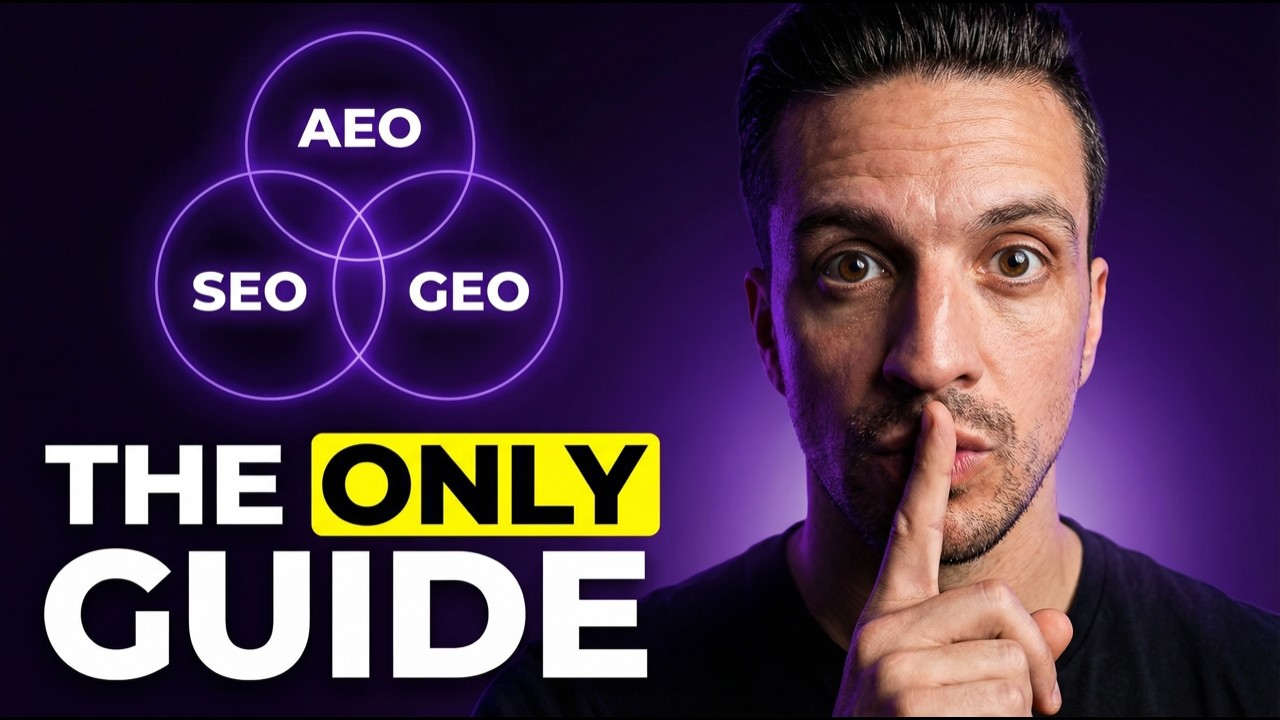
AI has become essential for SEO, automating tasks like keyword research, content optimization, and technical audits. Here's a quick overview of how AI is reshaping SEO:
- Smarter Content Creation: Tools like Jasper AI and Writesonic streamline content optimization using AI.
- Efficient Technical SEO: Platforms such as Rank Math and SEMrush simplify audits, schema markup, and Core Web Vitals improvements.
- Real-Time Competitor Tracking: AI tools like Surfer SEO and BrightEdge analyze competitors' strategies and predict rankings.
- Voice Search Optimization: With over 50% of searches now voice-based, AI helps optimize for natural, conversational queries.
Quick Comparison of AI SEO Tools
| Tool | Best For | Key Features | Starting Price |
|---|---|---|---|
| SEMrush | All-around SEO | Keyword research, competitor analysis, site audits | $140/month |
| Surfer SEO | Content optimization | Real-time scoring, NLP-based recommendations | $99/month |
| Rank Math | Technical SEO | Schema markup, Core Web Vitals insights | Free (Basic) |
| Jasper AI | Content creation | SEO-focused writing, multilingual support | $49/month |
AI tools are powerful, but human oversight is still crucial to ensure quality and ethical practices. Whether you're optimizing for voice search, tracking performance, or improving technical SEO, combining AI insights with human expertise is the key to success.
5 AI SEO Hacks to Rise Above Your Competition
AI SEO Tools and Systems
AI-powered SEO tools have come a long way, providing advanced solutions for improving search rankings and optimizing content. By using machine learning and natural language processing (NLP), these tools offer precise strategies that help businesses enhance their online visibility.
Top AI SEO Tools
| Tool | Key Features |
|---|---|
| SEMrush | Keyword research, competitor analysis, automated audits |
| Surfer SEO | Real-time content scoring, NLP-based recommendations |
| BrightEdge | Search trend forecasting, automated content optimization |
| Jasper AI | SEO-focused writing, multilingual support |
AI Ranking Skool, founded by Nico Gorrono, stands out as an educational platform offering tutorials and templates to help businesses make the most of these tools. With machine learning at their core, these tools are reshaping how SEO experts approach optimization.
The Role of Machine Learning in SEO
Machine learning powers many AI SEO tools, enabling them to predict trends and automate complex tasks. As Kyle Roof, Co-Founder & Lead SEO at POP, puts it:
"Machine learning is revolutionizing SEO by providing powerful tools and insights that enable businesses to optimize their online presence more effectively".
Some ways machine learning enhances SEO include:
- Keyword research tailored to trends
- Identifying content gaps strategically
- Prioritizing technical audits
- Predicting rankings with data-driven insights
Machine learning works hand-in-hand with NLP, analyzing patterns while understanding language, to create smarter content optimization strategies.
Using NLP for Content Optimization
NLP builds on machine learning by helping create content that ranks well and resonates with readers. Danny Sullivan, Google's public search liaison, highlights the importance of human involvement in AI-generated content:
"It's unlikely some AI content is going to feel written by people without some degree of human review".
NLP applications in SEO include:
- Improving alignment with search intent and semantic relevance
- Structuring content for better readability
- Optimizing for voice search
The NLP market is expected to grow to $453.3 billion by 2032, emphasizing its growing role in SEO. Tools like SEMrush and Hubspot use NLP for semantic analysis and readability scoring, helping creators align content with search intent effectively.
For the best results, these AI tools should be paired with human expertise to ensure content remains engaging and meets SEO standards.
Content and Keyword Optimization with AI
AI has reshaped how we approach content creation and keyword optimization, offering smarter tools for crafting search-engine-friendly and natural content.
AI Keyword Research Methods
Platforms like SEMrush and BrightEdge bring advanced features to keyword research, helping marketers analyze intent and spot trends with ease.
| Feature | Purpose | How It Helps |
|---|---|---|
| Intent Analysis | Aligns content with user needs and search stages | Enhances targeting and relevance |
| Trend Prediction | Spots rising keywords for future topics | Aids in strategic content planning |
| Competition Assessment | Gauges keyword difficulty for rankings | Focuses efforts on achievable goals |
| Semantic Clustering | Groups related keywords | Helps create well-rounded content |
AI-Driven Content Planning
HubSpot uses AI to analyze customer behavior and suggest personalized content ideas, making strategies more precise and effective.
AI tools streamline content planning by:
- Identifying Market Gaps and Predicting Outcomes: AI pinpoints untapped opportunities and forecasts how content will perform, guiding better decisions.
- Creating Content Briefs: AI generates detailed outlines based on top-performing examples, ensuring your content covers all the necessary points.
By integrating AI into your content planning, you can also prepare for the growing importance of voice search.
Voice Search Optimization
Voice search is now a major player, with over half of all searches happening this way. Among users aged 25-49, 65% regularly rely on voice search, making it a priority for digital strategies.
Here’s how to optimize for voice search:
- Write content that answers common questions in a conversational tone, mirroring how people speak.
- Structure content to appear in featured snippets, as these often serve as voice search answers.
- Use AI to refine your content for natural, spoken-language queries.
"Voice search optimization is essential for maintaining a competitive edge in today's AI-driven digital landscape."
The key is finding the right balance between automation and human input. AI excels at providing insights and handling repetitive tasks, but human creativity ensures content stays engaging and relatable. Regularly reviewing AI suggestions helps maintain quality and avoid over-optimization.
Technical SEO and AI Tools
Technical SEO has become much easier thanks to AI. Tasks that used to require significant time and effort can now be handled with accuracy and speed. Popular platforms like SEMrush and Ahrefs have integrated AI to simplify complex technical processes.
AI Website Audits
AI tools can scan websites thoroughly, spotting technical issues that impact search rankings. They examine several critical areas at once:
| Audit Component | AI Capability | Impact |
|---|---|---|
| Crawl Analysis | Detects indexing problems and site structure flaws | Helps search engines access your site better |
| Performance Monitoring | Measures page speed and server response times | Improves user experience |
| Mobile Optimization | Checks for mobile-friendliness | Ensures smooth performance on all devices |
| Security Assessment | Flags SSL issues and other vulnerabilities | Builds trust with users |
These tools don’t just find problems - they also help with implementing solutions, like structured data, which is vital for technical SEO.
Schema Markup with AI
AI-powered tools such as Rank Math make schema markup much easier. They can identify the type of content on a page, create structured data in JSON-LD format, and even verify its accuracy. This ensures search engines can better interpret your site’s content without requiring manual coding.
Core Web Vitals Optimization
Tools like Google PageSpeed Insights, enhanced with AI, provide specific recommendations to improve Core Web Vitals. They identify issues like slow loading speeds, delays in interactivity, or unexpected layout shifts and suggest practical fixes to address these problems.
Although platforms like Moz Pro and SEMrush offer robust automation features, human input is still critical. A person needs to ensure these optimizations align with the website’s goals and functionality. AI tools are transforming technical SEO, making it easier to monitor and improve performance effectively.
sbb-itb-061153f
SEO Performance Tracking with AI
AI tools are changing the game for SEO tracking, offering real-time updates, spotting unusual trends, and automating reports. These capabilities help businesses make smarter decisions, fine-tune their strategies, and stay ahead in the competitive SEO landscape.
AI Analytics Tools
Platforms like Databox and Qlik use AI to handle and analyze large amounts of SEO data across multiple platforms. They provide insights that are both timely and actionable, thanks to features like automated reports and real-time tracking.
| Analytics Feature | What It Does | Why It Matters |
|---|---|---|
| Real-time Monitoring & Reporting | Tracks performance continuously and delivers automated updates | Saves time and allows quick action |
| Anomaly Detection | Flags unusual patterns in data | Acts as an early warning system |
| Cross-platform Tracking | Combines data from various platforms | Offers a clear, unified view |
SEO Result Prediction
Tools like BrightEdge and Conductor take SEO forecasting to the next level by analyzing data to predict trends and performance. They help businesses:
- Spot Emerging Keywords: Identify trending search terms before they peak.
- Evaluate Ranking Potential: Assess the chances of ranking for specific terms.
"AI isn't the boogeyman. If anything, it can be a helpful tool that reshapes what SEO looks like, both for businesses and their customers." - Amanda Nze, SEO Content Writer
While forecasting your own rankings is essential, understanding what competitors are doing is equally important to stay ahead.
AI Competitor Analysis
SEMrush and Surfer SEO provide tools to monitor and analyze competitors’ strategies. These platforms focus on key areas like content, backlinks, and ranking metrics to help businesses refine their approach.
| Analysis Type | What You Learn | How It Helps |
|---|---|---|
| Content & Link Analysis | Finds opportunities and backlink tactics | Refines overall strategy |
| Ranking Factor Comparison | Highlights differences in key metrics | Optimizes performance |
| SERP Position Tracking | Tracks ranking shifts over time | Adjusts tactics as needed |
Combining AI’s ability to process data with human expertise is the real key to success. AI can handle the heavy lifting - analyzing trends and spotting patterns - but marketers must interpret these findings within the context of their industry and goals.
GrowthMachine uses AI to analyze massive datasets, helping businesses anticipate algorithm changes and adapt before their rankings are affected. Staying proactive with these insights ensures companies are ready for shifts in the SEO landscape.
As AI continues to reshape SEO tracking, the focus will also need to include ethical considerations and the potential for future advancements.
Ethics and Future of AI SEO
As AI continues to transform SEO, ethical practices and responsible use are becoming more important than ever. The rise of AI in search optimization brings both exciting possibilities and challenges that demand thoughtful management.
Human Input in AI SEO
AI tools are excellent at processing data, but human expertise is still essential for making strategic decisions and ensuring ethical practices. The goal is to strike the right balance between automation and human judgment.
| Role Type | Key Responsibility | Outcome |
|---|---|---|
| Strategic Oversight | Decision-making and context | Clear, informed direction |
| Quality Control | Content assessment and ethics | Greater accuracy |
| Technical Guidance | Implementation and monitoring | Responsible execution |
"AI must be designed and used in ways that prioritize transparency, accountability and fairness" - Irina Proskurina, CEO of E-PR Online
That said, while AI holds great promise, it also introduces challenges, especially in areas like bias and fairness.
AI Bias in SEO
AI bias can significantly impact SEO, particularly in content creation and search result rankings. Common issues include:
- Gender stereotypes in AI-generated content
- Algorithm biases affecting content visibility
- Lack of diversity in training data
To tackle these problems, companies should:
- Conduct regular algorithm audits
- Use tools that detect bias
- Train AI systems with diverse datasets
- Continuously monitor and refine AI outputs
As AI tools improve, they aim to address these shortcomings while opening up new possibilities.
New AI SEO Tools
Emerging AI SEO tools are designed to overcome current challenges and broaden functionality:
| Technology | Expected Impact |
|---|---|
| Advanced NLP | Better understanding and optimization of content |
| Predictive Analytics | More precise ranking predictions and trend analysis |
| Voice Search AI | Enhanced conversational search experiences |
"Ignoring alternative search engines tied to AI chatbots risks missing untapped audiences" - TDMP
The SEO market is forecasted to grow to $122.11 billion by 2028, underscoring the importance of ethical AI practices. To stay ahead, businesses should:
- Create clear guidelines for AI usage
- Prioritize strong data privacy measures
- Train teams in AI-related skills
- Ensure transparency in how AI is applied
Balancing technological progress with ethical responsibility is key to thriving in AI-driven SEO. Companies that focus on building trust and delivering value will stand out in the ever-changing digital world.
Conclusion
Main AI SEO Guidelines
As AI reshapes the SEO landscape, following these principles can help businesses maximize its benefits.
| Focus Area | Key Guidelines | Implementation Tools |
|---|---|---|
| Content Optimization | Leverage AI for keyword research and planning | SEMrush, Surfer SEO |
| Technical Analysis | Perform regular AI-driven site audits | SEO.ai, AI Search Grader |
| Performance Tracking | Keep an eye on metrics and competitors | Google Analytics integration |
| Ethical Oversight | Combine automation with human judgment | Custom AI monitoring systems |
AI SEO tools are only as effective as the way they're used. For example, users of Jasper AI and Writesonic report better content results when pairing AI insights with human input. These tools are most effective when tailored to meet specific business goals and industry needs.
With these principles in place, the next focus should be on actionable implementation.
Next Steps
To apply AI SEO strategies effectively, take these steps:
Start by reviewing your current SEO setup. Tools like Ubersuggest offer free assessments to highlight immediate areas for improvement. This helps establish a starting point to track future progress.
Then, create a detailed AI integration plan. Begin with accessible tools that offer core features while helping your team build expertise. For instance, ChatGPT can generate keyword suggestions and content ideas, making it a great starting tool for businesses new to AI SEO.
Lastly, set up a system to track performance. Many successful organizations use a mix of AI analytics tools and human oversight to ensure high-quality outcomes. This balanced approach prevents over-reliance on automation and maintains strategic control.
For seamless implementation, integrate AI tools with analytics platforms, train your team to use prompts effectively, and consistently monitor results to adjust strategies. Stay updated with the latest tools and technologies to keep your AI SEO efforts on track.
FAQs
Which is the best AI for SEO?
The best AI SEO tool depends on your specific goals, whether you're focusing on technical SEO, content optimization, or starting out as a beginner. Here's a breakdown of some top options and their strengths:
| Tool | Best For | Starting Price | Key Features |
|---|---|---|---|
| Alli AI | Technical SEO | $299/month | Automated audits, technical fixes |
| SEMrush | Broad SEO Needs | $140/month | Competitor analysis, rank tracking |
| Surfer SEO | Content Optimization | $99/month | SERP analysis, content scoring |
| Ubersuggest | Beginners | Free (Basic) | Keyword research, site audits |
- Alli AI is a top choice for technical SEO, offering strong automation features that help agencies and teams handle technical fixes efficiently.
- For beginners, Ubersuggest provides free tools that make it easy to establish a solid SEO foundation.
"The most effective AI SEO strategies combine AI's analytical power with your creativity, intuition, and industry knowledge."
When choosing a tool, keep these factors in mind:
- Integration: Make sure the tool works well with your current tools and systems.
- Scalability: Pick a platform that can grow with your business.
- Support: Look for tools with good documentation and customer service.
For video SEO, TubeBuddy and VidIQ are great options, offering features like title and tag optimization.
Many SEO professionals rely on SEMrush for competitor analysis and use Surfer SEO for optimizing their content. With these tools, you can tailor your AI SEO strategy to meet your business needs.





